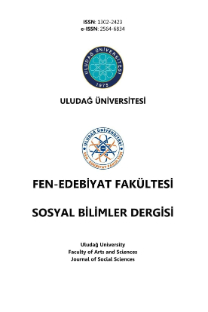THE CHALLENGING FACETS OF EFL LEARNERS’ WRITING PERFORMANCE
İngilizceyi Yabancı Dil Olarak Öğrenen Öğrencilerin Yazma Performansının Zorlu Özellikleri
___
Barone, Diane & Joan M. Taylor (2006). The Practical Guide to Classroom Literacy Assessment. USA: Corwin Press.Burnett, Rebecca & Lee-Ann Marie Kastman (1997). “Teaching Composition: Current Theories and Practices”. In G. Phye (Ed.) Handbook of Academic Learning: Construction of Knowledge (pp. 265- 305). USA: Academic Press, Inc.
Canagarajah, Suresh (2001). “Addressing Issues of Power and Difference in ESL Academic Writing”. In J. Flowerdew & M. Peacock (Eds.) Research Perspectives on English for Academic Purposes (pp. 117-131). Cambridge: CUP.
Culham, Ruth (2003). 6+1 Traits of Writing: The Complete Guide Grades 3 and UP. USA: Scholastic Inc.
Edwards, E. (1998). “Assessment that Drives Instruction”. In G. L. Taggart, S. J.Philer, J. Anixon & M.Wood (Eds.) Rubrics: A Handbook for Construction and Use (pp. 1-22). USA: Rowman & Littlefield Education.
Ferris, Dana R. & John Hedgcock (2014). Teaching L2 Composition: Purpose, Process and Practice. New York: Routledge.
Hamp-Lyons, Liz (2003). “Writing Teachers as Assessors of Writing”. In B. Kroll (Ed.) Exploring the Dynamics of Second Language Writing (pp. 162-189). Cambridge: CUP.
Hyland, Ken (2003). Second Language Writing. Cambridge: CUP.
Kellogg, Ronald T. (1994). The Psychology of Writing. Oxford: OUP.
Luongo-Orlando, Katherine (2003). Authentic Assessment: Designing Performance-Based Tasks. Canada: Pembroke Publishing.
Mayer, Richard (2003). “Memory and Information Processes”. In I.B. Weiner (Ed.) Handbook of Psychology (pp. 47-58). New Jersey: John Wiley & Sons.
Neff-Lippman, Joyce Magnatto (2012). “Assessing Writing”. In I.L. Clark (Ed.) Concepts in Composition: Theory and Practice in the Teaching of Writing (pp. 145-180). New York: Routledge.
Williams, James D. (2014). Preparing to Teach Writing: Research, Theory and Practice. New York: Routledge.
Yin, Robert (2003). Application of Case Study Research. USA: Sage Publication, Inc.
- ISSN: 1302-2423
- Yayın Aralığı: 2
- Başlangıç: 1999
- Yayıncı: Bursa Uludağ Üniversitesi
TERÖRİZM VE CİHAD ÜZERİNE KAVRAMSAL BİR MUKAYESE
KLASİK BALE TEMSİLİNİN SANATÇI ADAYLARI ÜZERİNDEKİ ETKİSİ
Zümrüt GEDİK, Füsun GÖKKAYA, Serap TEKİNSAV-SÜTÇÜ
BABY DOE VAKASI ÖZELİNDE ENGELLİ YENİDOĞANLARA DAİR ETİK SORUNLARIN TARİHİ
ABDÜLHAK HÂMİD’İN PİYESLERİNDE ARAP İMAJI
KURUMSAL SOSYAL SORUMLULUĞUN FİRMA PERFORMANSINA ETKİSİ: TÜRKİYE ÖRNEĞİ
ZİHİN KURAMI VE GELİŞİM SÜREÇLERİ
Thomas Hardy’nin Jude The Obscure Eserinde Tek Boyutlu İnsan
